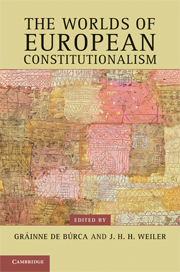Book contents
- Frontmatter
- Contents
- Contributors
- Introduction
- Prologue: global and pluralist constitutionalism – some doubts
- 1 The European Union as an international legal experiment
- 2 The place of European law
- 3 The ECJ and the international legal order
- 4 Local, global and plural constitutionalism
- 5 The case for pluralism in postnational law
- Dialogical epilogue
- Bibliography
- Index
4 - Local, global and plural constitutionalism
Europe meets the world
Published online by Cambridge University Press: 05 June 2012
- Frontmatter
- Contents
- Contributors
- Introduction
- Prologue: global and pluralist constitutionalism – some doubts
- 1 The European Union as an international legal experiment
- 2 The place of European law
- 3 The ECJ and the international legal order
- 4 Local, global and plural constitutionalism
- 5 The case for pluralism in postnational law
- Dialogical epilogue
- Bibliography
- Index
Summary
Introduction
The idea that constitutionalism is central to the legitimate exercise of public power has dominated the modern liberal imagination since the Enlightenment. The ideal of limited collective self-governance has spawned a rich and highly diverse tradition of hard-fought national constitutions from the time of the Glorious Revolution into the present. Today, however, constitutionalism faces its greatest challenge yet: the question of its continued relevance to modern governance. With the explosion of governance beyond the state, many wonder whether constitutionalism as we know it is being marginalized or altogether undermined.
The dilemma of constitutionalism in the age of global governance has elicited two principal responses – one local and one global. On the one hand, there are those who, alarmed by the threat of global intrusion, have sounded the retreat into local constitutionalism as the only source of legitimate public power. Local constitutionalists (or ‘new sovereigntists’, as they are sometimes called) deny the normative pull of international, transnational and global governance by anchoring all legal authority in local (i.e. national) constitutions. The realm beyond the state is, on this view, pure power politics with resort to legalism as a simple tool of self-interest alone. On the other hand, there are those who view global governance optimistically as overcoming the inherent limitations of local constitutionalism. The strong version of this second response seeks nothing less than to redefine constitutionalism itself by placing the local in the service of the global. These global constitutionalists view the state simply as playing one particular role within a rational design for a comprehensive system of multi-layered governance that spans all issues and all people around the globe.
- Type
- Chapter
- Information
- The Worlds of European Constitutionalism , pp. 150 - 202Publisher: Cambridge University PressPrint publication year: 2011
- 25
- Cited by



